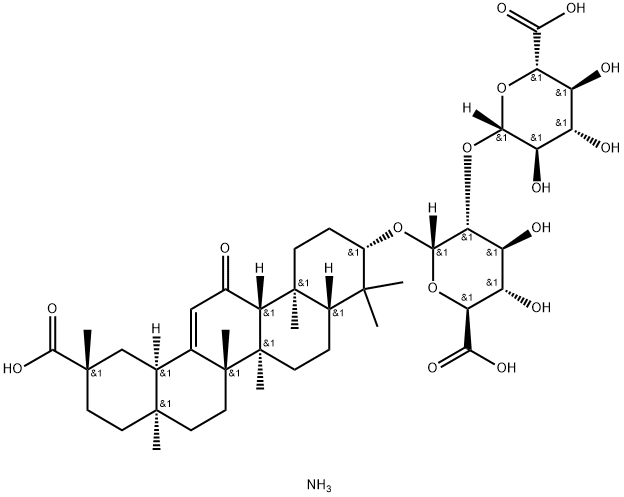Diammonium glycyrrhizinate
|
|
Diammonium glycyrrhizinate Eigenschaften
- storage temp.
- under inert gas (nitrogen or Argon) at 2-8°C
- L?slichkeit
- Soluble in DMSO
- Aggregatzustand
- Solid
- Farbe
- White to off-white
Sicherheit
Diammonium glycyrrhizinate Chemische Eigenschaften,Einsatz,Produktion Methoden
Beschreibung
Diammonium Glycyrrhizinate is the diammonium salt of glycyrrhizin and the active constituent in the traditional Chinese medicinal herb Glycyrrhiza uralensis (Chinese liquorice or Gan-Cao) with anti-inflammatory, antioxidant and hepatoprotective properties. Diammonium glycyrrhizinate (DG) is slowly metabolized within the cells into glycyrrhetic acid, which inhibits enzymes that control cortisol metabolism and contributes to this agent's anti-inflammatory effect. Although the exact mechanism of action remains to be fully elucidated, DG may prevent or reduce hepatotoxicity via the scavenging of free radicals. This agent also upregulates the expression of transcription coactivator PGC-1alpha and modulates hepatic enzymes such as alanine aminotransferase (ALT), aspartate aminotransferase (AST), superoxide dismutase and glutathion peroxidase.Occurrence
Diammonium glycyrrhizinate, a traditional Chinese medicine (TCM), is extracted and purified from liquorices (Radix glycyrrhizae).Verwenden
Diammonium glycyrrhizinate (DG) is an ammonium salt preparation of 18-alpha-glycyrrhizin—exhibits antiinflammation, immunomodulation, anti-anaphylaxis, and membranous protection effects.Currently, the family of glycyrrhizin is used in clinical practice as an effective liver protector against most hepatic diseases such as chronic viral hepatitis, drug-induced liver injury, nonalcoholic fatty liver disease, autoimmune hepatitis, and hepatocellular carcinoma.Diammonium glycyrrhizinate Upstream-Materialien And Downstream Produkte
Upstream-Materialien
Downstream Produkte
Diammonium glycyrrhizinate Anbieter Lieferant Produzent Hersteller Vertrieb H?ndler.
Global( 285)Lieferanten
| Firmenname | Telefon | Land | Produktkatalog | Edge Rate | |
|---|---|---|---|---|---|
| Hebei Chuanghai Biotechnology Co,.LTD | +86-13131129325 |
sales1@chuanghaibio.com | China | 5868 | 58 |
| Hubei XinRunde Chemical Co., Ltd. | +8615102730682 |
bruce@xrdchem.cn | CHINA | 566 | 55 |
| Shanghai Zheyan Biotech Co., Ltd. | 18017610038 |
zheyansh@163.com | CHINA | 3619 | 58 |
| career henan chemical co | +86-0371-86658258 +8613203830695 |
sales@coreychem.com | China | 29858 | 58 |
| Chengdu GLP biotechnology Co Ltd | 028-87075086 13350802083 |
scglp@glp-china.com | CHINA | 1824 | 58 |
| Chengdu Biopurify Phytochemicals Ltd. | +86-28-82633860; +8618080483897 |
sales@biopurify.com | China | 3772 | 58 |
| Xiamen AmoyChem Co., Ltd | +86-86-5926051114 +8615060885618 |
sales@amoychem.com | China | 6383 | 58 |
| Henan Xiangtong Chemical Co., Ltd. | 86-371-61312303 |
info@hnxtchem.com | CHINA | 292 | 58 |
| NanJing Spring & Autumn Biological Engineering CO., LTD. | +8613815430202 |
sale02@cqherb.com | CHINA | 376 | 58 |
| Hubei xin bonus chemical co. LTD | 86-13657291602 |
linda@hubeijusheng.com | CHINA | 22963 | 58 |
79165-06-3()Verwandte Suche:
Glycyrrhizinsure
Ethambutol
5-(1,2-Dithiolan-3-yl)valeriansure
D-Glucurons?ure, gamma-Lacton
Tiopronin
[S-(R*,S*)]-N-(3-Amino-2-hydroxy-4-phenylbutyroyl)-L-leucin
α-D-Glucopyranosiduronsure, (3β,20β)-20-Carboxy-11-oxo-30-norolean-12-en-3-yl-2-O-β-D-glucopyranuronosyl-, Dikaliumsalz
(3β,18α,20β)-3-Hydroxy-11-oxoolean-12-en-29-sure
2-O-β-D-Glucopyranosyl-α-D-glucose
Dodecyl-α-D-glucopyranosid
- 18A-DIAMMONIUM GLYCYRRHIZINATE
- Diammonium glycyrrhizinate
- DiaMMoniuM Glycyrrhizate
- a-D-Glucopyranosiduronic acid
- 18α-DIAMMONIUM GLYCYRRHIZINATE
- Diammonium Glycyrrhizinat
- N-(3-CHLOROBENZYL)-N-PHENYLBENZENESULFONAMIDE
- Diammonium Glycyrrhizinate for Injection
- Diammonium Glycyrrhizinate 79165-06-3
- Dioammonium Glycyrrhizinate
- Diammonium glycyrrhizinate USP/EP/BP
- (2S,3S,4S,5R,6R)-6-(((2S,3R,4S,5S,6S)-6-carboxy-2-(((3S,4aR,6aR,6bS,8aS,11S,12aR,14aR,14bS)-11-carboxy-4,4,6a,6b,8a,11,14b-heptamethyl-14-oxo-1,2,3,4,4a,5,6,6a,6b,7,8,8a,9,10,11,12,12a,14,14a,14b-icosahydropicen-3-yl)oxy)-4,5-dihydroxytetrahydro-2H-pyran-3-yl)oxy)-3,4,5-trihydroxytetrahydro-2H-pyran-2-carboxylic acid, diammonia salt
- GLYCYRRHIZICACIDDIAMMONIUMSALT
- Diammonium Glycyrrhizinate ( GMP )
- Glycyrrhizin diamine
- Diamine glycyrrhetinic acid
- (2S,3S,4S,5R,6R)-6-[(2S,3R,4S,5S,6S)-2-[[(3S,4Ar,6aR,6bS,8aS,11S,12aS,14aR,14bS)-11-carboxy-4,4,6a,6b,8a,11,14b-heptamethyl-14-oxo-2,3,4a,5,6,7,8,9,10,12,12a,14a-dodecahydro-1H-picen-3-yl]oxy]-6-carboxy-4,5-dihydroxyoxan-3-yl]oxy-3,4,5-trihydroxyoxane-2-carboxylic acid
- Glycyrrhizinate, Diammonium
- Diammonium Glycyrrhizinate, 10 mM in DMSO
- 79165-06-3
- C42H68O16N2
- C42H62O162NH3
- C42H68N2O16







